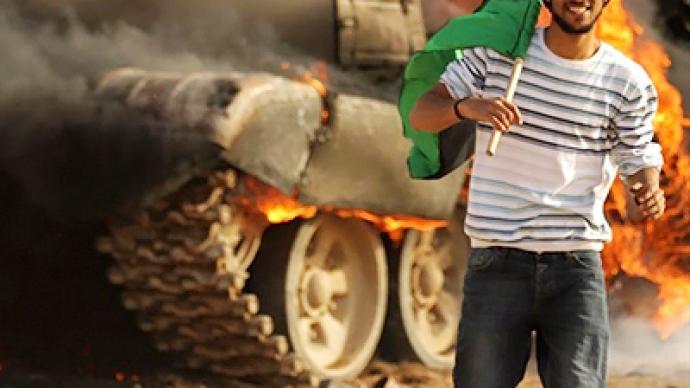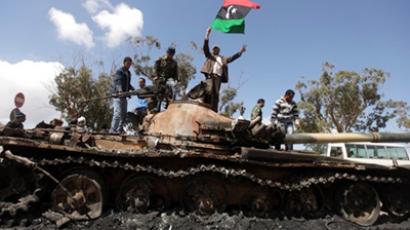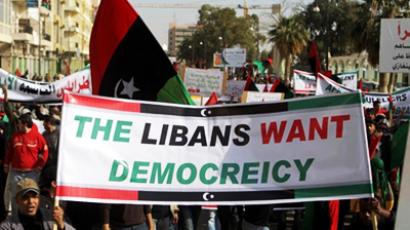Libyan opposition heads west with new victories

Libyan rebels continue to advance toward the capital Tripoli, after securing control of the strategic oil towns of Ras Lanouf, Brega and Ajdabiya from Muammar Gaddafi's forces.
Recent reports claim that rebel troops have also taken control of the town of Bin Jawad, shortly after they entered the crucial oil port of Ras-Lanouf, located 660 km (410 miles) from Tripoli. In the latest advance marking an important turnaround in the military conflict, the rebels have managed to secure such key strategic positions as the city of Ajdabiya, the Marsa-el-Brega oil seaport and the town of Uqayla. This headway puts the rebels back in control of the cities they had lost in the last week. The next major city and challenge on the way to the capital Tripoli is the city of Sirt – Gaddafi’s hometown known for its strong support for the Libyan leader.Although the mood in the cities recaptured by the rebels has been marked by celebration, some of the local residents have expressed distress over the rebel fighters, saying some of their leaders cannot be trusted. On Saturday the city of Misrata, located just 200km (125 miles) east of Tripoli and still alleged to be under the control of Gaddafi forces, had experienced heavy fighting and shelling. US army officials claim they have fired some one hundred Tomahawk missiles at the city and at least five Libyan planes and two helicopters have been destroyed on its outskirts.Meanwhile, NATO has approved a plan to assume control of the mission in Libya, which would include enforcing a UN arms embargo and the no-fly zone. "Along with its non-NATO partners, NATO will do everything it can to deny any use of air power and it will do so with care and precision to avoid harming the people of Libya," said Charles Bouchard, the Canadian general in charge of the operations, in a statement released on Sunday by the alliance.
Journalist and author Afshin Rattansi believes the operation has already gone too far and that despite the alleged transfer of control, the US will retain its leadership.“I think we can bet that there are already SAS and other forces on the ground," Rattansi suggested. “And as for a [NATO-led] mission – I think it is absurd. The US is, of course, still behind it, even though Robert Gates [US Defense Secretary – ed.] had a lot of reservations about it."
Is opposition’s euphoria justified?
The focus of the rebel groups now is to advance westward; however, their euphoria may not last long. It is expected that forces loyal to Gaddafi will show much stronger resistance to the fighters. What raises concern is that it took the rebels almost a week to overcome the might of Gaddafi’s army, and this confirms how reliant the opposition troops have been on international involvement. Also, there are concerns that the rebels themselves are poorly organized, which they show in the face of chaos. They are quick to run away and quick to disperse. Some of them are also quite young and inexperienced.What is confusing and unclear at this stage is just how far Gadaffi’s forces have been pushed back and how much of his military might has been destroyed.From now on the rebels will be on the offensive, which presents the coalition with a question – whether or not they will continue to support the rebels. The rebels have actually called on the coalition forces to conduct more air strikes, admitting that they encountered almost no defense in Ajdabiya. It remains unclear how far the Western alliance will go in terms of providing air cover and protecting the opposition fighters as the conflict goes on. The opposition leaders claim they have commitments from a number of western countries who say they will be supplying them with arms. Besides, a scenario might unfold in which Gaddafi’s troops will be pushed into the desert or in which fighting will begin in the cities currently fully under Gaddafi’s control, where there have previously been no military operations.If the coalition continues to fight in these places, this will clearly be an offensive and will contradict the intention of merely protecting civilians from Gaddafi’s strikes. In some places a strong opinion already exists that coalition forces have already violated the UN Security Council resolution, aimed at protecting civilians. The Libyan government accused the Western community of taking sides in an internal conflict. Government spokesperson Ibrahim Mussa was quoted as saying Western military involvement is “immoral”, “illegal”, and “an action that was not authorized by the UN Security Council”. Mussa also said that despite the coalition claims that they are in Libya to protect civilians, they are merely pushing the country on the brink of the civil war. Meanwhile, on Sunday NATO is expected to take command of the no-fly zone over Libya. NATO ambassadors are also meeting to discuss whether or not they can expand their role in operation, possibly turning the no-fly zone into what is being called a “no-fly plus”. US officials have allegedly said there are only few more steps in the planning process, after which the command of the whole mission will pass to the NATO members. Although Libyans do not really seem to expect much from the change of command, the opposition leaders may be a little concerned, as within a 28-member NATO coalition there is a bigger chance that some members may veto further actions, thus cutting military support of the rebel forces. According to RT correspondent Paula Slier, who is in Tripoli monitoring the situation, Libyans are concerned that as a result of the present situation Libya will be stuck in a stalemate, and will be ultimately be divided in two. However, most people, regardless of their political views, do not seem satisfied with such a scenario.














